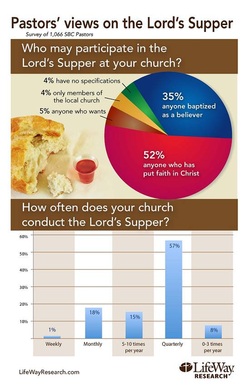The majority of Southern Baptist churches permit anyone who has put their faith in Jesus Christ to participate in the Lord's Supper, according to a survey by LifeWay Research. The survey also revealed that 57 percent of SBC churches observe the Lord's Supper quarterly.

"Denominational distinctions are often evident in how the Lord's Supper is observed," said Scott McConnell, director of LifeWay Research. "We sought to measure two attributes of Southern Baptists' remembrance of Jesus' death and resurrection: who may participate in the Lord's Supper -- with five distinct options listed -- and the frequency it is observed."
The survey of 1,066 SBC pastors found 96 percent of their churches allow individuals who are not members of that local church to participate in the Lord's Supper. Only 4 percent restrict participation to local church members.
According to the survey, 52 percent of SBC churches offer the Lord's Supper to "anyone who has put their faith in Jesus Christ." Thirty-five percent say "anyone who has been baptized as a believer" may participate. Five percent of SBC churches serve communion to "anyone who wants to participate," while 4 percent of churches don't specify any conditions for participation.
"A single question cannot capture all the nuances of who churches allow to participate. There are many descriptive phrases different people prefer," McConnell said. "However, the choices provided address key attributes mentioned in the Baptist Faith and Message such as believer's baptism and church membership. Today, many Southern Baptist churches may nuance their answers in different ways, but this gives a helpful picture of where SBC pastors are on the issue when choosing between the provided options.
"Clearly, though, this survey points out a difference between the beliefs expressed in the Baptist Faith and Message, and the Lord's Supper practices of many Southern Baptist churches," McConnell said.
Article VII of the Baptist Faith and Message 2000 (SBC.net/bfm) lists baptism as a "prerequisite to the privileges of church membership and to the Lord's Supper." Article VII also says the Lord's Supper is for "members of the church."
While quarterly observance of the Lord's Supper is the norm for nearly 60 percent of all Southern Baptist churches, 1 percent observe the Lord's Supper weekly. Eighteen percent offer it monthly and 15 percent from five to 10 times a year. Another 8 percent conduct the Lord's Supper less than four times a year.
The survey also found sharp regional differences in the frequency with which Southern Baptist churches conduct the Lord's Supper. Pastors of churches in the Northeast (67 percent) and West (45 percent) are more likely to say they observe the Lord's Supper monthly than pastors of churches in the Midwest (17 percent) and South (14 percent).
The majority of churches in the South (61 percent) and Midwest (58 percent) conduct the Lord's Supper quarterly compared to churches in the West (29 percent) and Northeast (12 percent).
Methodology: These questions were asked as part of a mail survey of SBC pastors conducted April 1 - May 11, 2012, that included the option of completing it online. The mailing list was randomly drawn from a stratified list of all SBC churches. The 1,066 completed surveys were weighted to match the actual geographic distribution and worship attendance of SBC churches. The sample provides 95 percent confidence that the sampling error does not exceed plus or minus 3.0 percent. Margins of error are higher in sub-groups.
The survey of 1,066 SBC pastors found 96 percent of their churches allow individuals who are not members of that local church to participate in the Lord's Supper. Only 4 percent restrict participation to local church members.
According to the survey, 52 percent of SBC churches offer the Lord's Supper to "anyone who has put their faith in Jesus Christ." Thirty-five percent say "anyone who has been baptized as a believer" may participate. Five percent of SBC churches serve communion to "anyone who wants to participate," while 4 percent of churches don't specify any conditions for participation.
"A single question cannot capture all the nuances of who churches allow to participate. There are many descriptive phrases different people prefer," McConnell said. "However, the choices provided address key attributes mentioned in the Baptist Faith and Message such as believer's baptism and church membership. Today, many Southern Baptist churches may nuance their answers in different ways, but this gives a helpful picture of where SBC pastors are on the issue when choosing between the provided options.
"Clearly, though, this survey points out a difference between the beliefs expressed in the Baptist Faith and Message, and the Lord's Supper practices of many Southern Baptist churches," McConnell said.
Article VII of the Baptist Faith and Message 2000 (SBC.net/bfm) lists baptism as a "prerequisite to the privileges of church membership and to the Lord's Supper." Article VII also says the Lord's Supper is for "members of the church."
While quarterly observance of the Lord's Supper is the norm for nearly 60 percent of all Southern Baptist churches, 1 percent observe the Lord's Supper weekly. Eighteen percent offer it monthly and 15 percent from five to 10 times a year. Another 8 percent conduct the Lord's Supper less than four times a year.
The survey also found sharp regional differences in the frequency with which Southern Baptist churches conduct the Lord's Supper. Pastors of churches in the Northeast (67 percent) and West (45 percent) are more likely to say they observe the Lord's Supper monthly than pastors of churches in the Midwest (17 percent) and South (14 percent).
The majority of churches in the South (61 percent) and Midwest (58 percent) conduct the Lord's Supper quarterly compared to churches in the West (29 percent) and Northeast (12 percent).
Methodology: These questions were asked as part of a mail survey of SBC pastors conducted April 1 - May 11, 2012, that included the option of completing it online. The mailing list was randomly drawn from a stratified list of all SBC churches. The 1,066 completed surveys were weighted to match the actual geographic distribution and worship attendance of SBC churches. The sample provides 95 percent confidence that the sampling error does not exceed plus or minus 3.0 percent. Margins of error are higher in sub-groups.


 RSS Feed
RSS Feed